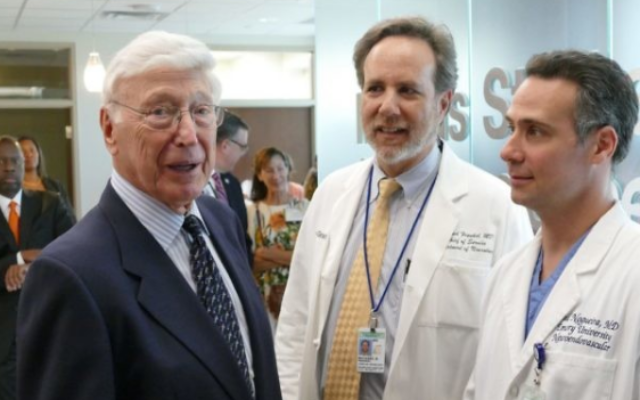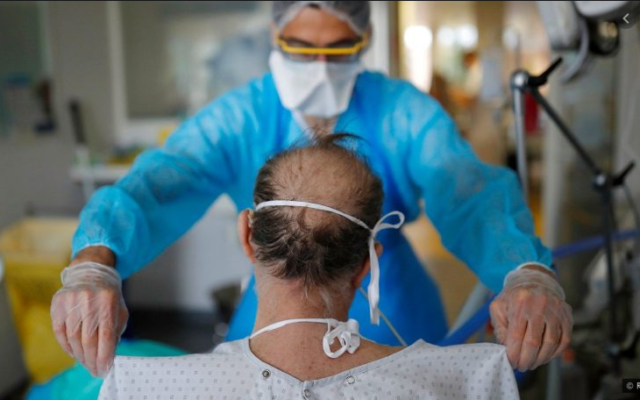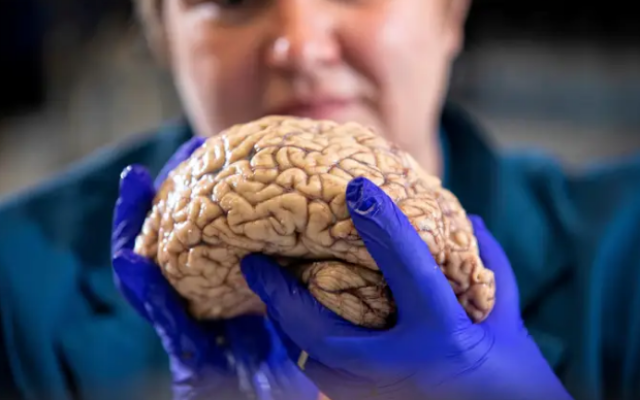Grady Doctor Talks Brain Issues with COVID
Dr. Michael Frankel of Grady’s Marcus Stroke and Neuroscience Center comments on recent medical findings.
Earlier this month the British medical journal Brain published a report that warned that doctors may be missing signs of serious and sometime fatal brain illnesses that were showing up in patients that had only mild symptoms of a COVID-19 virus infection.
We asked Dr. Michael Frankel, professor of neurology at Emory University School of Medicine, about the new findings.
The journal reported that among 40 patients that were studied, 12 had inflammation of the central nervous system, 10 suffered from delirium or psychosis, eight had strokes and another eight had serious nerve disease.
The main author of the July 8 study, Dr. Michael Zandi at the University College London’s Institute of Neurology, was particularly concerned that these conditions developed even though patients had, in his opinion, “only trivial lung disease.”

“We’re seeing things in the way COVID-19 affects the brain that we haven’t seen with other viruses.”
The cases reported in Britain have added to what some doctors believe are the longer-term effects of COVID-19, which include numbness in the body, weakness and memory problems even when other symptoms of the disease have disappeared.
Frankel, an international authority on brain health, has been chief of neurology and director of the Marcus Stroke and Neuroscience Center at Grady Hospital since its founding.
AJT: How do you see this study?
Frankel: There are two pieces to the puzzle. Does the virus cause direct neurological or neurovascular or other types of neurologically related pathology or is it indirect, meaning does it cause something to happen somewhere else in the body that triggers the neurological illness? Most commonly you would think of inflammation that the virus might trigger or a tendency for forming blood clots that may create more neurological illness. So we are, I think, still at that early stage of recognizing that it is possible that it causes both direct and indirect neurological illness.
AJT: How concerned are you that COVID-19 can increase the incidence of stroke?
Frankel: We’re very concerned about stroke. We understand that there is a tendency for clotting that I think is very apparent now. This virus does create a tendency towards forming blood clots, which could lead to more strokes or more deadly form of strokes, which are in larger blood clots blocking larger arteries.
There was a report from Mount Sinai Health System in New York in May about young patients developing large artery blockages or occlusions in the brain, and that was they were seeing more of that than they felt that they would ordinarily. But it’s another numerators study, like the one in Brain, meaning, here’s what we’re seeing, now we have to put it in context. Is it just a random issue or is it really happening in significant numbers?

AJT: Is there some historic precedent for the neurological effects of the COVID-19 virus?
Frankel: It’s been known for over 100 years that the influenza virus can trigger neurologic disease. I mean, the most famous one was back in 1917 and 1918. There were, at that time, patients who developed serious central nervous system disease. It looked a lot like Parkinson’s disease.
There are people who get the flu and then a week or six weeks later, they develop encephalomyelitis [brain and spinal chord inflammation]. So we know that that these organisms can trigger these responses. The question is, is it happening at a greater rate than we would expect? And is there a particular pattern this virus is creating? And we don’t know that yet. We are still very concerned about it. And we were very aggressive with trying to understand it at the patient level
AJT: How concerned are you about how the fear of COVID-19 infection is affecting how and when people seek treatment for stroke?
Frankel: We have this collateral damage phenomenon because of the fear factor that people have that if they go to the hospital they could be exposed to COVID-19 illness. We are seeing patients coming to the hospital later than they should with stroke symptoms. That means that they may not benefit from the treatment as much as if they had called 911 immediately.
AJT: How important is time when you’ve had a stroke?
Frankel: Every second counts when the brain is in trouble. We want to get the word out that treatments are time-dependent and that when you develop weakness on one side of your body or difficulty speaking, you need to call 911 immediately.
AJT: So how important is the work of the Marcus Stroke Center?
Frankel: This is a truly valuable resource, and now more so than ever, because, we’re in a war zone. And, you know, the enemy is this virus. And having this jewel of the Marcus Stroke Center at Grady for Atlanta and surrounding communities is a true blessing.




comments